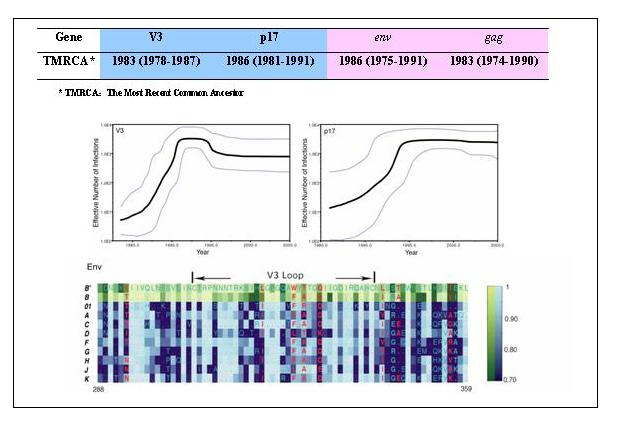Wuhan Institute of Virology, CAS made important discovery about HIV-1 B’ molecular evolution and molecular characteristics
Date:24-07-2009 | 【Print】 【close】
Recently, WIV, CAS has published its research paper about HIV-1 B’ molecular evolution and molecular characteristics on the world renowned journal—AIDS (2008.22(14):1851-1858). According to AIDS Reviewers comments, “the paper s strongest areas are the careful and detailed genetic analyses and presentation of phylogenetic data on globally relevant subtype B and B strains.”
Dr. Rongge Yang and Dr. Simon Rayner worked together for one year in this comprehensive research about the molecular origin and properties of HIV-1 subtype B , and found the origin of B’ was around mid-1980s; the transmission rate of B’ was faster than other HIV-1 strains but has slowed down in recent years. Eight and nine distinct signature mutation sites unique to B’ also were found in the p17 and V3 regions respectively, which suggested some sites might be correlate with the antigenic specificity of B’ strain and some signature amino acids might correlate to the tropism of the cell receptor of HIV-1 B’ strain. This profound study analyzed the B’, the founder strain of the HIV-1 transmission in Asia, in a comprehensive respect, provides highly valuable and significant results for future HIV epidemiology research and vaccine design.
B’ is one of the three major strains of HIV-1 prevalent in Asia, it was highly prevent in central China among Plasma Blood Donors. The co-circulation of HIV-1 B’ and other HIV-1 subtype had result in many HIV-1 recombinant forms. These recombinant forms play a vital role in HIV-1 epidemic in Asia and become more and more hazardous. Therefore, studying on origin, spread and evolution of B’ are of key importance to HIV prevention.
Senior scientist Dr. Rongge Yang has long been focusing on fundamental research of HIV/AIDS, he has led his group to carry out a series of studies on HIV epidemiology, viral anti-drug mechanism etc. Senior scientist Dr. Simon Rayner who is the leader of bio-informatics group is adept in exploitation and application of analysis methods, especially for data of large scale.
